April 2, 2024
Discover the spirit of Tin Wis: sharing Tla-o-qui-aht culture at home and abroad
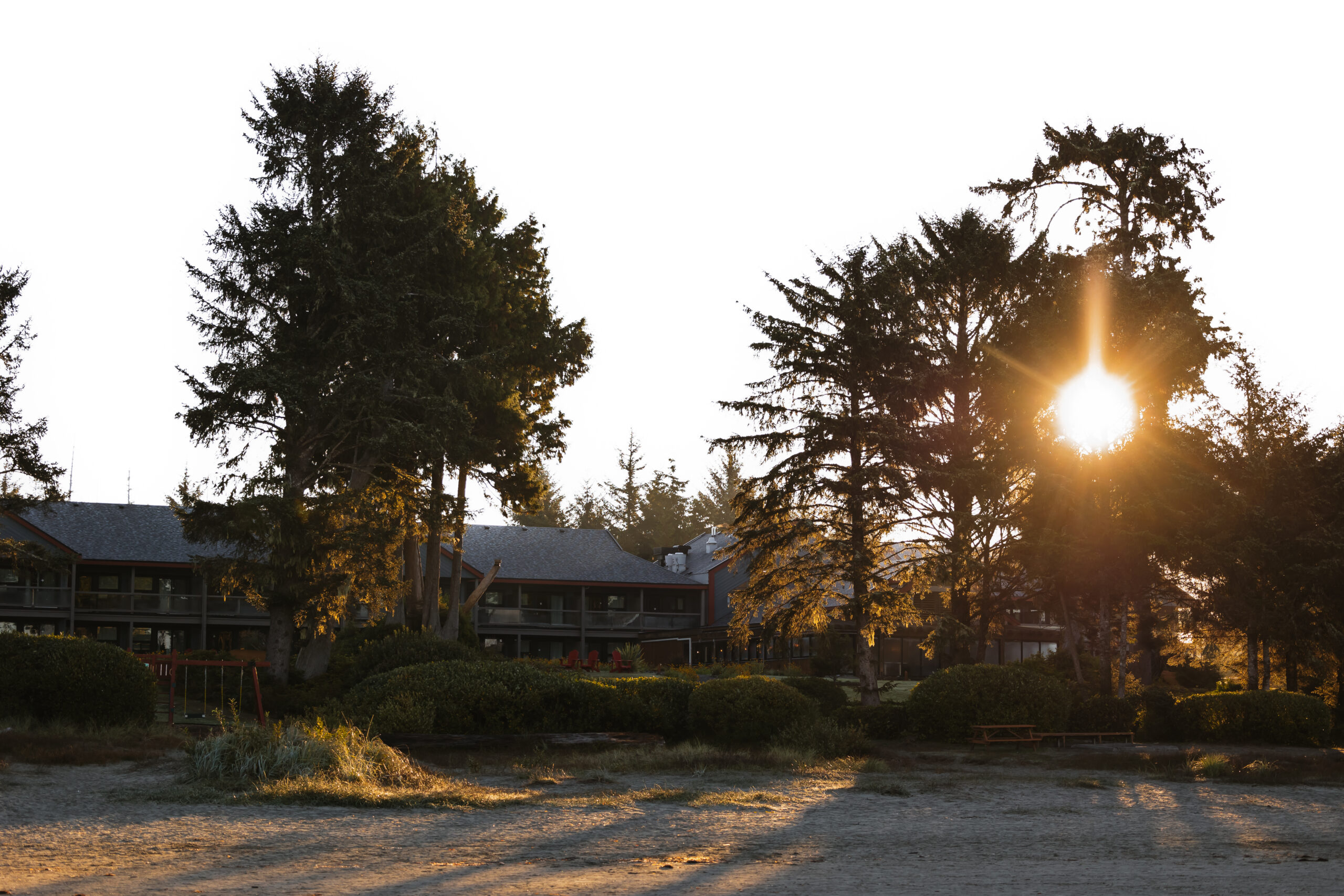
By Erin Linn McMullan
Integral to the spirit of Tla-o-qui-aht-owned Tin Wis Resort is the desire to welcome guests into these deeply meaningful ancestral homelands and to share a rich and storied culture. When you visit Načiks (Tofino), named by Time Magazine as one of the top 50 destinations in the world, it is important to understand that this is not a “remote wilderness” but “wałyuu”, meaning “home” and that unparalleled beauty is a result of Indigenous-led stewardship since time immemorial. The true heart of oceanfront Tin Wis Resort is its People whose connection to this place is profound.
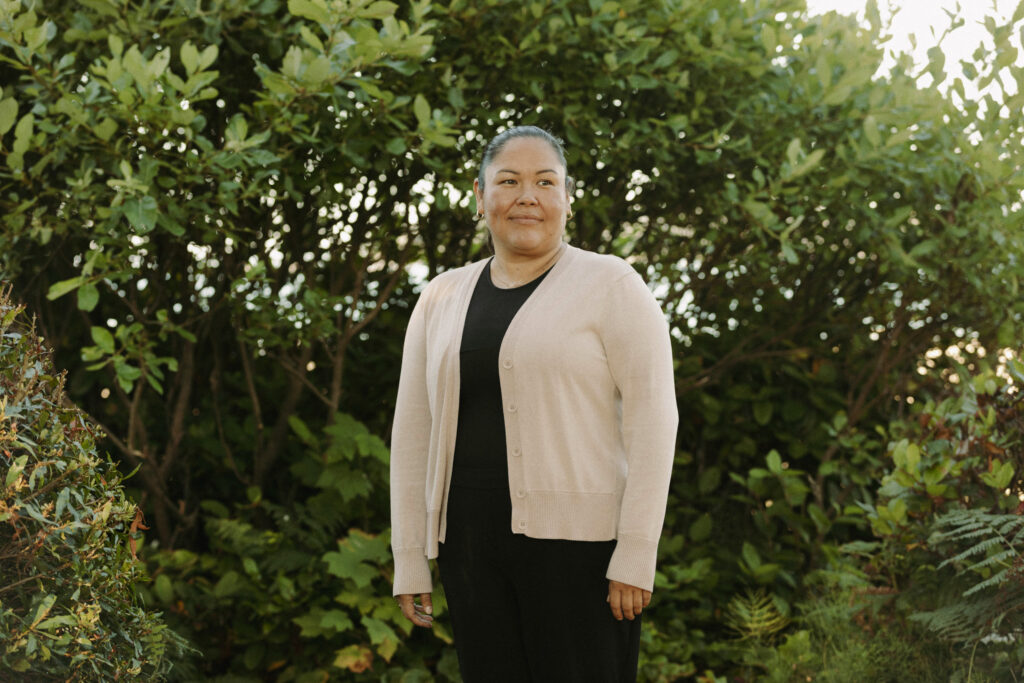
When you enter the resort’s generous lobby and fireside lounge you may be greeted by the warm smile of Maria Clark, Tla-o-qui-aht citizen and Assistant General Manager.
“When I first started in this position a year ago, I wasn’t sure how I was going to maneuver myself,” says Maria, who explains that in addition to navigating tasks like Admin and HR, “there is also a part of me that feels like I have a responsibility as an Indigenous manager – now that we own and operate the hotel. It’s my personal mission to put things out there.”
Indigenizing the property is a priority for Tin Wis and she envisions creating a program in future which could include a couple of traditional Nuu-chah-nulth dugout canoes to facilitate interpretive tours, salmon bakes on the beach, and cross-training local Nuu-chah-nulth staff as ambassadors to provide an introduction to Tla-o-qui-aht history and respectfully visiting and as the core of the year-round workforce.
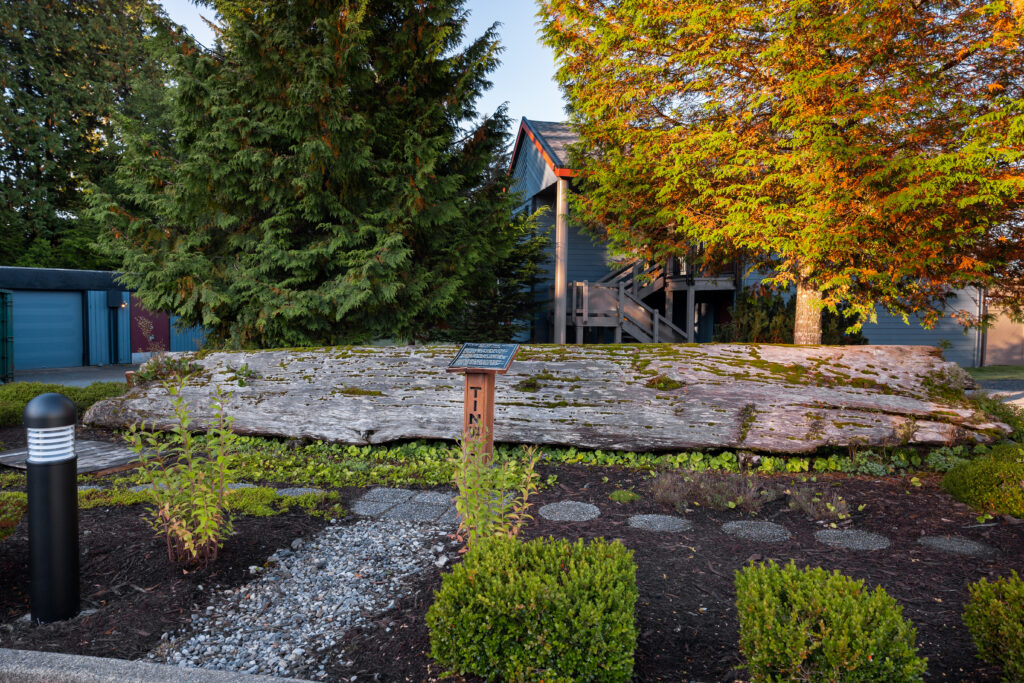
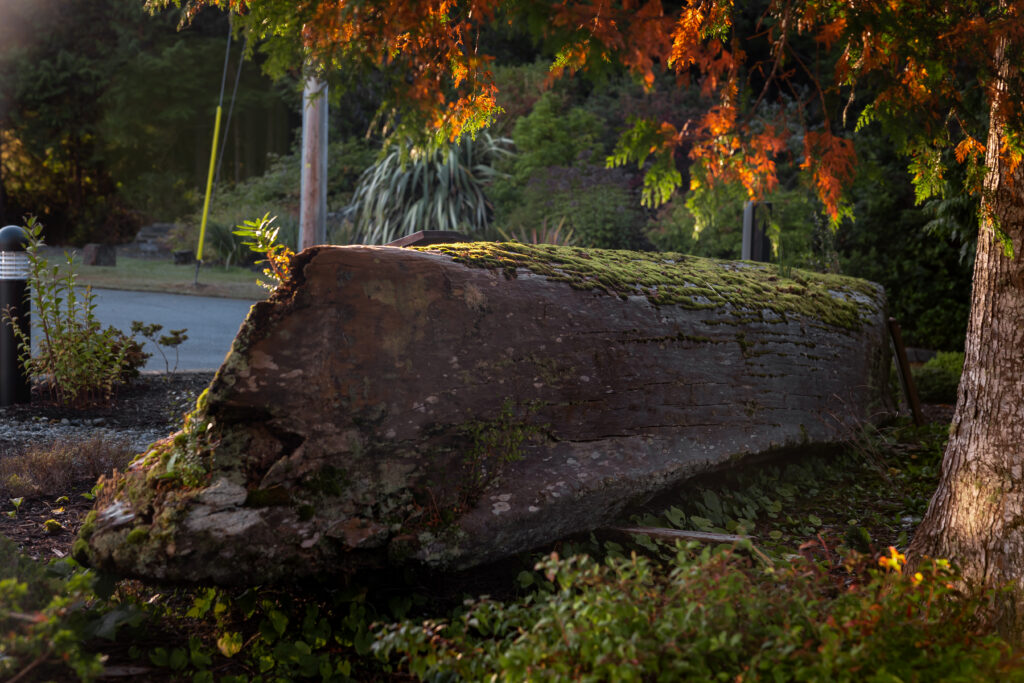
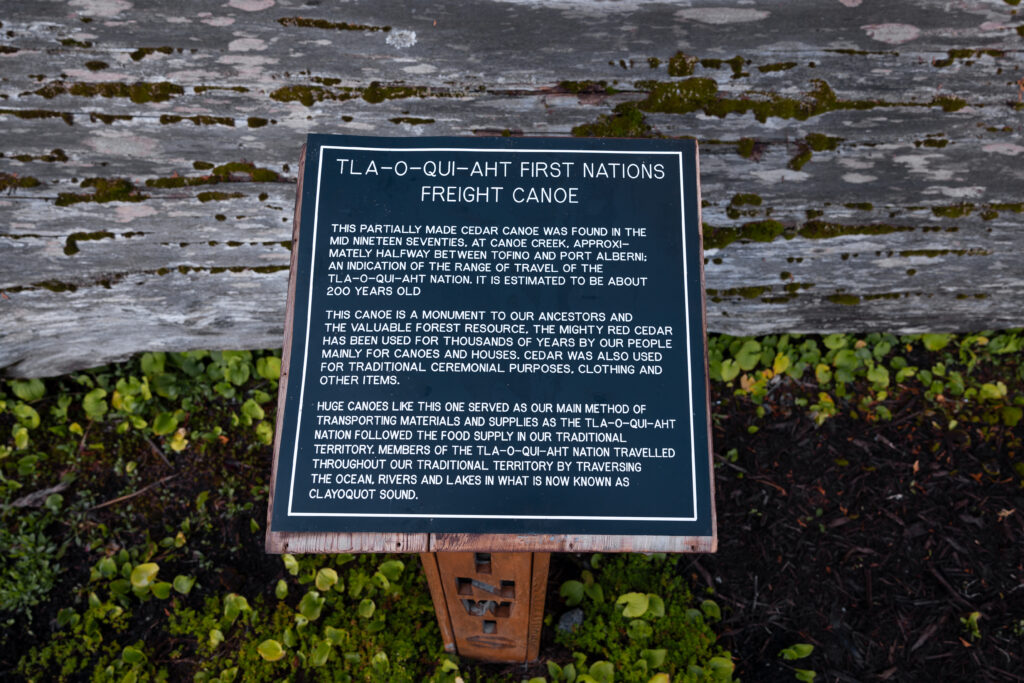
Maria, who has worked for the resort for decades, reflects that the original board of Tin Wis had a mission statement whose goals were focused on employment, engagement, and becoming more of a teaching facility and opportunity for Tla-o-qui-aht, as well as a guest experience – which can only be enhanced by a culturally rich environment.
She hopes young people will also be inspired by interactive cultural events like naaʔuu hosted at the resort in the conference centre for its second year, starting May 24 to June 29, 2024. naaʔuu – a Nuu-chah-nulth word which means “to feast together” – combines cuisine with an art immersion and performative storytelling, dance, and song, with all proceeds supporting Tla-o-qui-aht language and cultural resurgence.
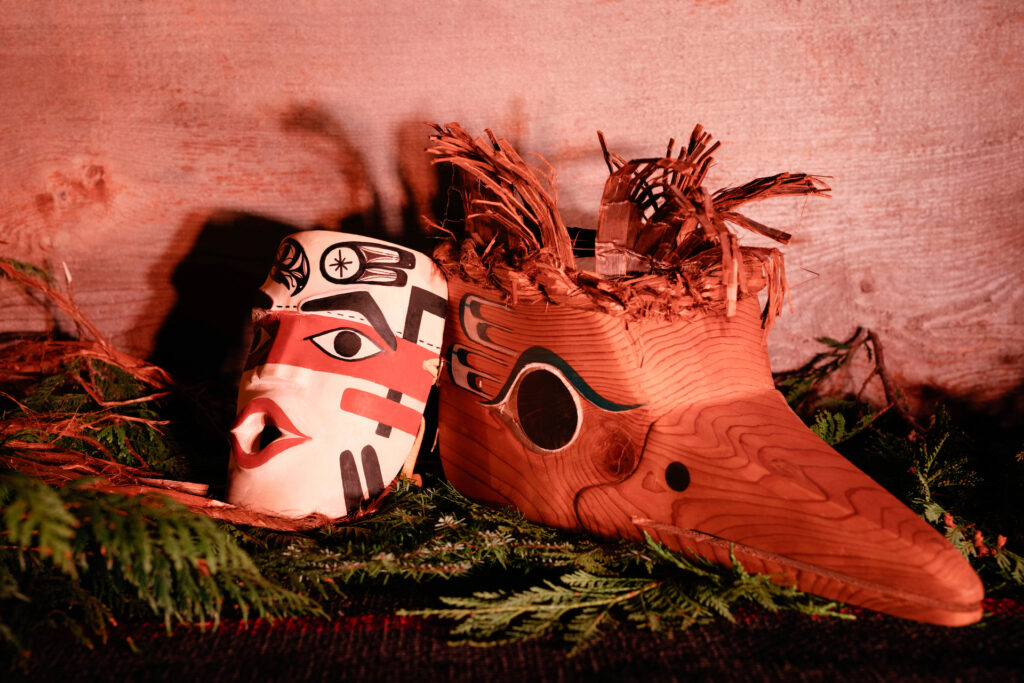
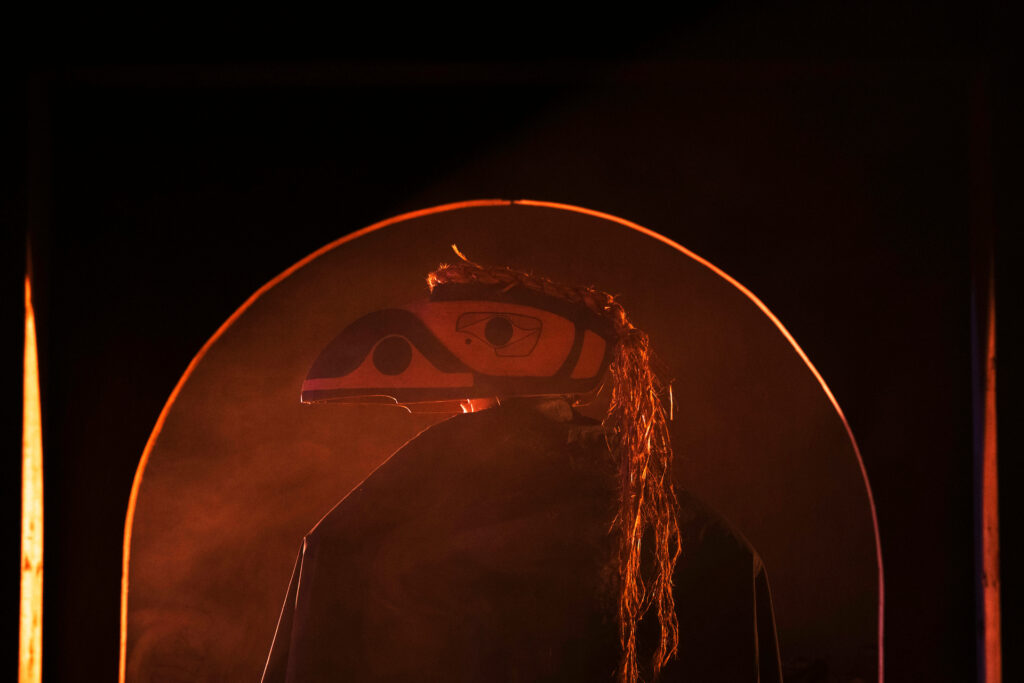
Maria herself is freshly inspired after attending the International Women in Industry (IWI) 2024 conference in Roturua, Aotearoa (aka New Zealand), traveling, along with Gisele Martin, as part of a small local delegation. The conference’s He Moemoeā (Vision) focuses on “Uniting Indigenous women for a stronger global economy, people, and planet.” Beginning on February 4, 2024, Indigenous women leaders converged from across the world: Canada (BC and Alberta), Australia, Pacific Islands, Polynesia, Melanesia, Chile and Colombia to share insight and culture.
Maria’s first introduction to Māori culture and history was while wandering solo through the Auckland War Memorial Museum before traveling to the conference in Roturua. She witnessed the performance of the traditional Māori haka, a dance which would also be featured in the conference’s marae (ceremonial welcome amidst meeting grounds). “They talked about the haka and its different meanings,” she explains, “and when they’re singing relative to the uterus, making it come from so low in the body and how it related to the land and teachings. It was informative and educational, and really relatable.”
While Māori share a common language – there are many nations and dialects across Aotearoa and each iwi (People or nation) has its own unique haka relating significant events in its history.
The highlight of Maria’s experience was the location where the conference was being hosted at Te Puia, situated amidst the wonderland of Te Whakarewarewa geothermal valley (geysers, hot pools, boiling mud), and one of the first places she would go on tour afterwards with Zen Seekers. Te Puia was restored to the Māori People in 2017 for iwi ownership and management and today provides employment, economic income, and ongoing opportunities to give back to the community.
This site included an incredible restaurant and catering service, Pātaka Kai, an outdoor coffee bar, a spa with steaming pools and hot mud baths, and Te Puia New Zealand Māori Arts and Crafts Institute where they teach traditional stone and bone carving, wood carving, weaving, and tattooing in an outdoor covered area. The school is funded by the tourist attraction along with up to six Māori student scholarships – one for each discipline. Maria was impressed by how teaching traditions were incorporated into the tourism experience and the diverse opportunities for young employees to engage in carving, work at the onsite catering centre, and give guided tours. “It instills so much pride in their people.
“That’s what they do in Aotearoa. I would love to see that for all communities – it’s a tourism hub but also very educational for communities.”

On tour after the conference, Maria overcame her own sense of intimidation to feed stingrays with Dive Tatapouri just outside Tairāwhiti Gisborne. As the guide pointed out, this remarkable experience is “trust-based”. “These girls are Tamaraki (the children of Tangaroa, the Māori god of the sea) so they’re seen as guidance, and we want to treat them with the utmost respect.”
“When I got in there,” Maria recalls, “it was so different. I wasn’t afraid at all. It was a calming experience, really cool, they kept coming up to my feet and sucking on the toes of my shoes.” Stingrays pick up on sound waves for navigation, and as the guide explained to Maria, “You sound interesting to them.”
Wader-clad visitors using a wooden staff for balance line up on the reef at low tide and are given a chunk of barracuda along with instructions on how to feed the stingrays. Guides standby ready to answer questions and to gently herd Eagle Ray and short-tailed stingrays, even bribing one with a snack for co-operation to display its barbed tail. In the video, Maria can be seen petting the stingray’s rubbery surface as it undulates through the water like an underseas butterfly. She was delighted that, “They’re as interested in us as we are in them.”
The post-conference tour focused on Māori- and iwi-owned business in marine-based environments providing culturally rooted tourism experiences, food and accommodation, as well as those that employ and inspire local iwi youth, such as the young guide for the stingray experience who now aspires to become a marine biologist. From oyster farms to protected eel habitat to caves filled with glow-worms glimmering like stars in a subterranean sky, it was an opportunity to listen and learn about regional culture and history.
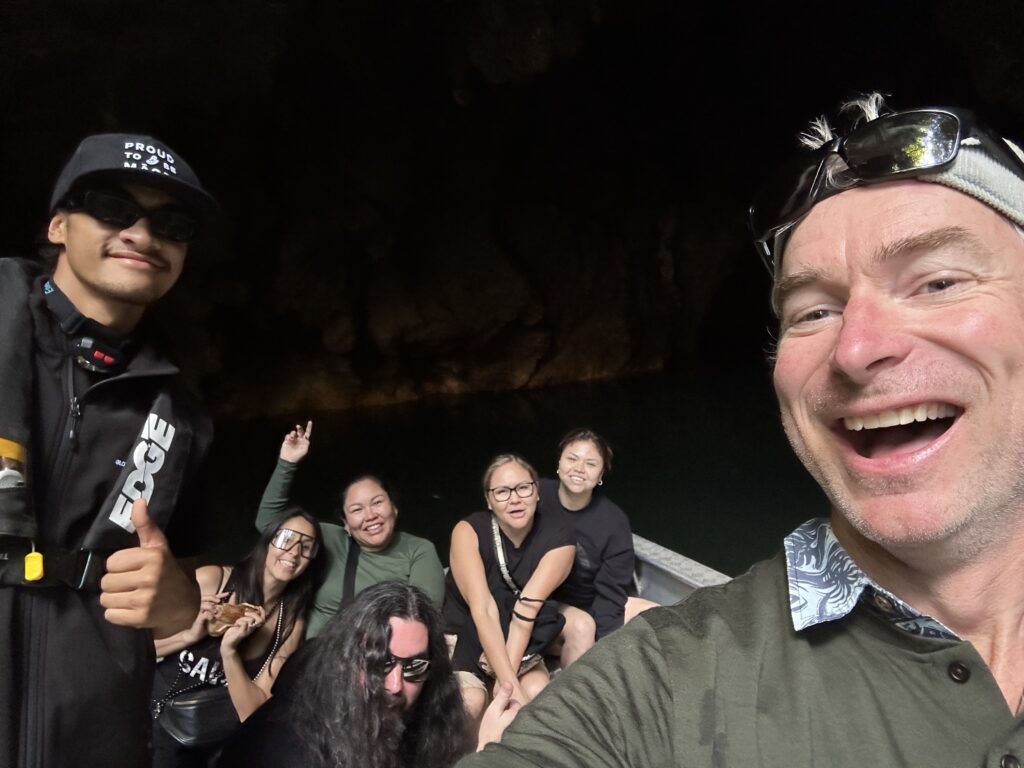
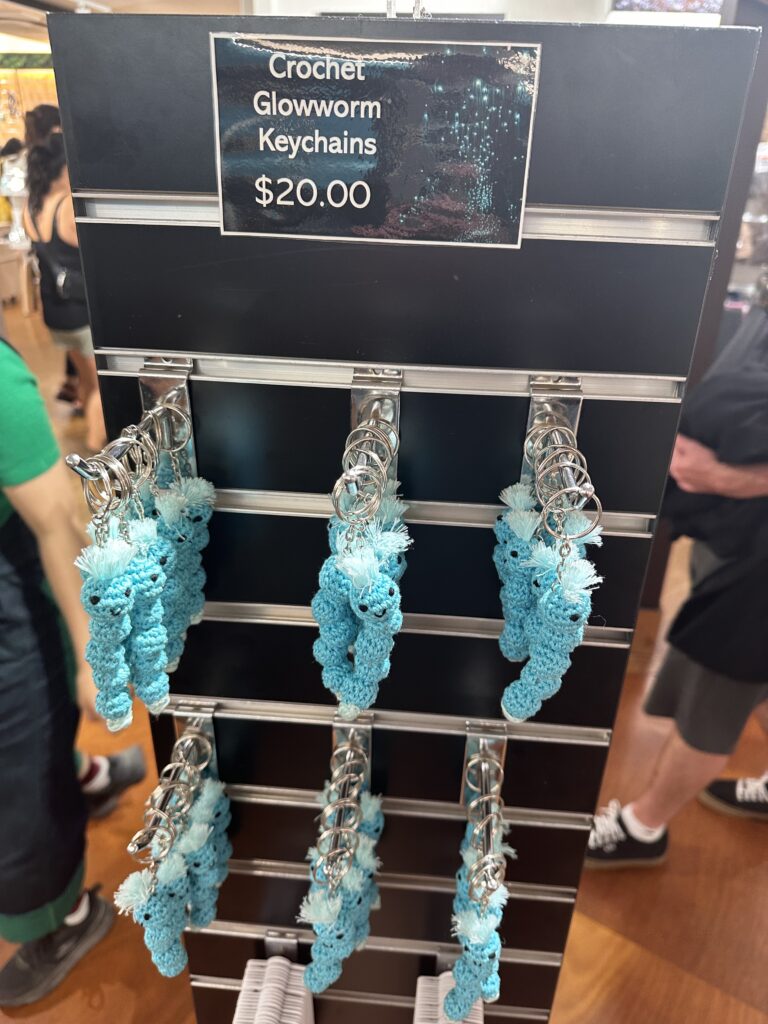
Key takeaways from Aotearoa’s thriving Māori-led tourism included: how tourism helps communities thrive, providing generation inspiration through revitalization of culture as well as youth training, internships, and scholarships; iwi role in environmental and species preservation; and how a larger community network or trail of Indigenous-led experiences can provide a more meaningful experience for travelers.
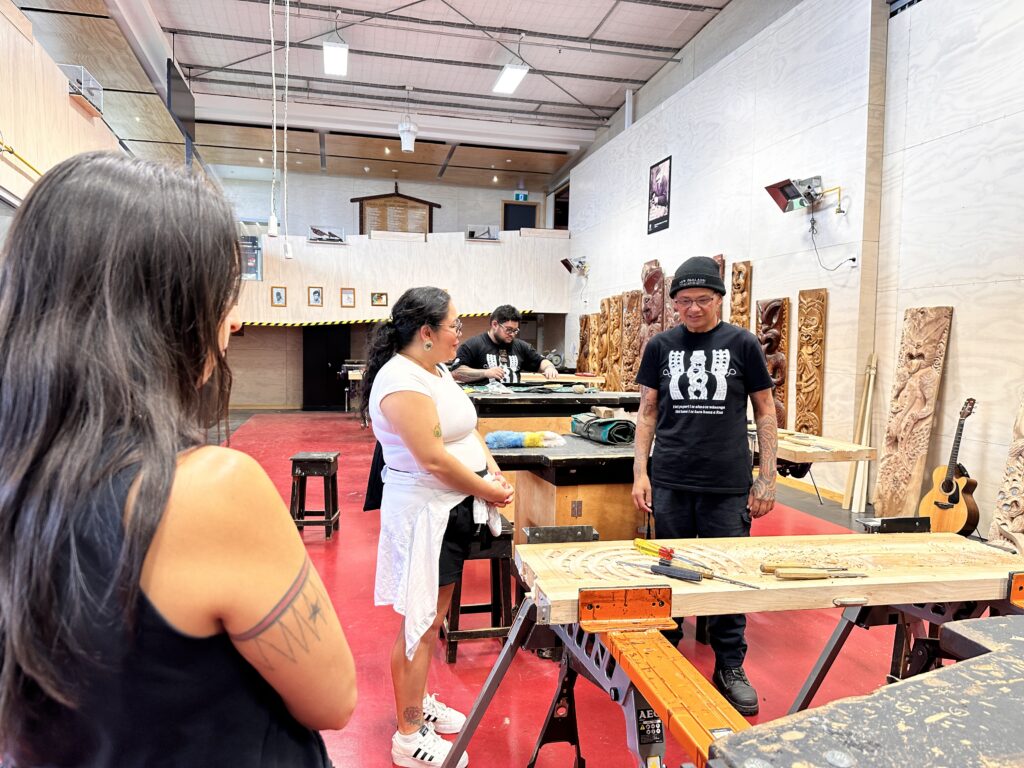
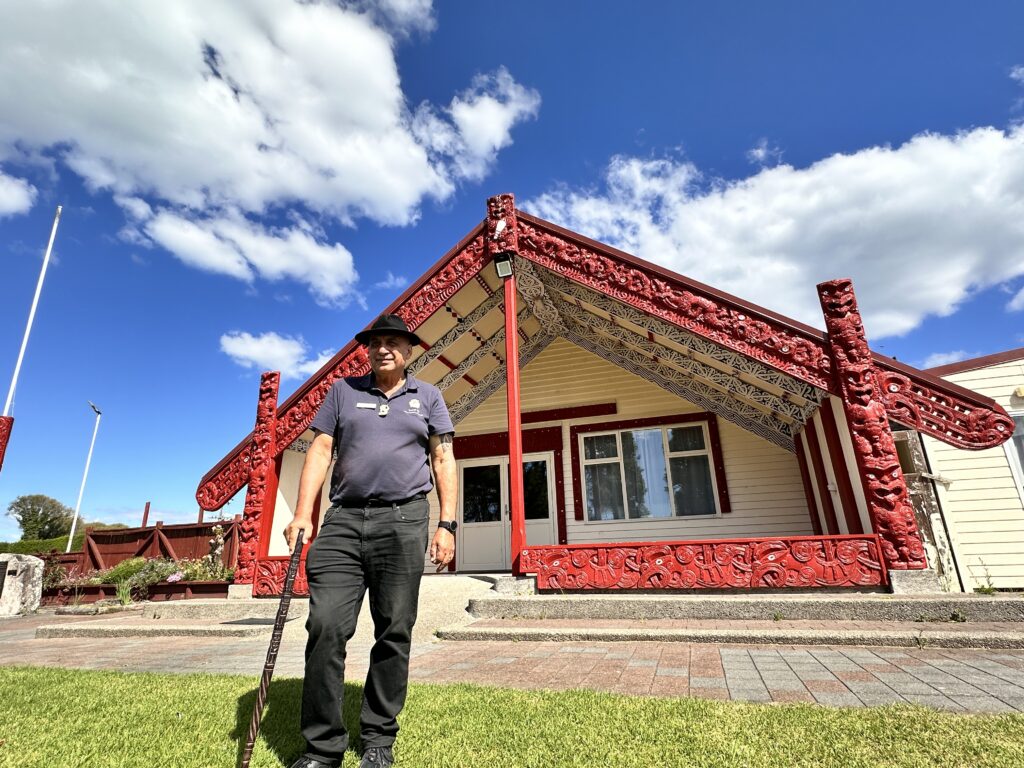
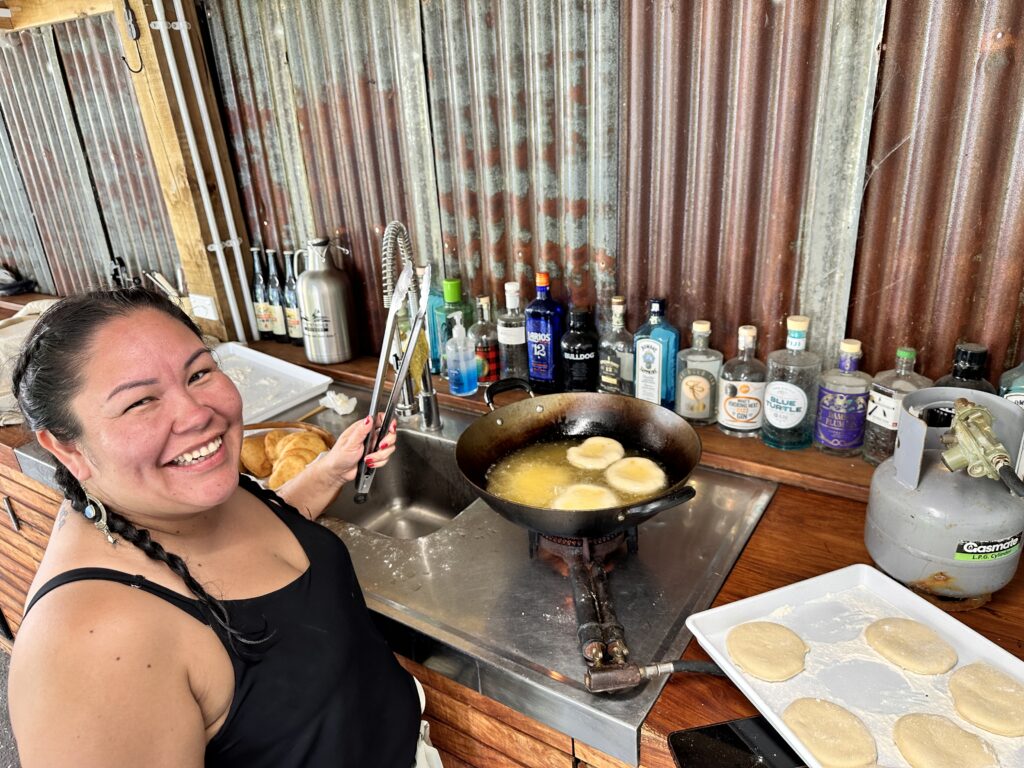
“I got a lot out of the small business experiences we did,” says Maria. “Just being able to see the visions I have in my mind (for Tin Wis) living, it really touched my heart.” She brought home a renewed sense of possibilities as well as inspiration for how to help drive those changes. “Now I have an opportunity to create more benefits for our community and being able to celebrate those things.”
Maria reflects on what she learned over her journey to Aotearoa. “The biggest thing coming home for me was realizing the relation of Indigenous People to colonialism, all sitting here – what I imagine is going on from one Indigenous community and land to another – those similarities we all carry together whether it be trauma, revitalization, traditions and language, all of those things I recognize but never really felt because it was all stripped away from us our identities. It made me sad, but it also made me feel better about this because we’re not alone in the struggle – really profound to me – we’re all in this together.”
Maria had four days at home to snuggle her grandchildren before departing for Unceded Algonquin Anishinabeg Territory (Ottawa, Ontario) and the Indigenous Tourism Association of Canada (ITAC) 2024 awards ceremony on February 28, 2024, where two Indigenous-led Tofino-based businesses received awards. Tin Wis-managed Tsawaak RV Resort & Campground won for “Leading the Way in Business Development (community-based)”, and Ahousaht-owned adventure tourism operator, Ahous Adventures won for “New Operator or Business That Launched a New Experience”.
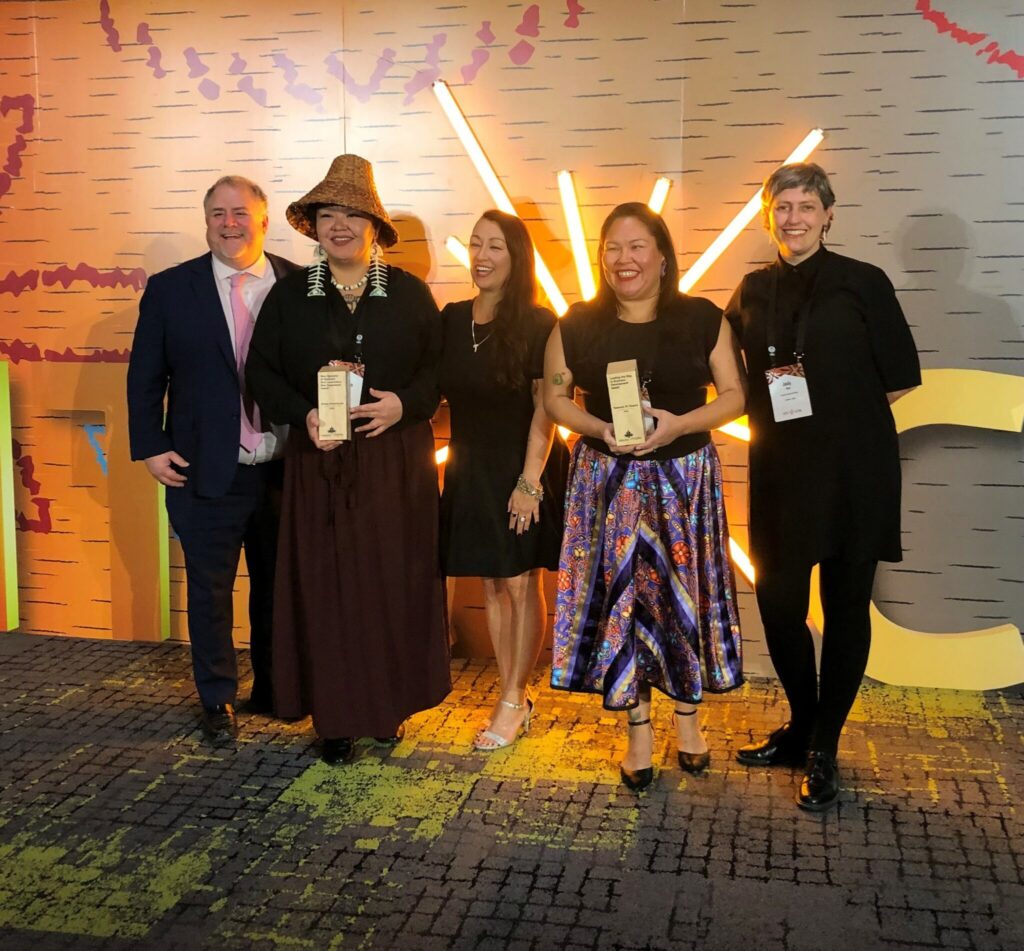
Returning home to Tla-o-qui-aht Tribal Parks, Maria would reflect, “Of all the places, I have been in the last month, home is still the most beautiful.”
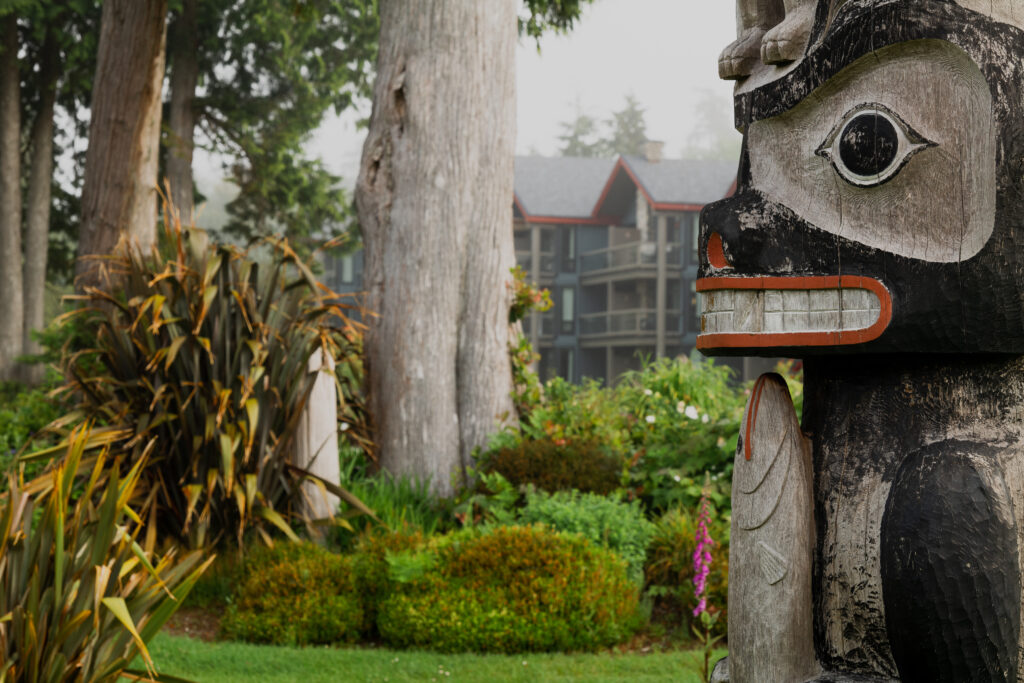
Tla-o-qui-aht is currently “working alongside Ahousaht and the Province of BC to establish 77,000 hectares of Indigenous-led conservancies in Clayoquot Sound, including all tiičmis areas within Tla-o-qui-aht Tribal Parks. Nuu-chah-nulth Peoples use the word, tiičmis, which may be translated as ‘life’, or ‘life-source’, to describe our relationship to other living beings and our sacred responsibility to care for life-giving relationships in all aspects of our lives.”[i]
As Saya Masso, Manager of Lands and Resources, points out, “The Tla-o-qui-aht land vision is to implement our ‘tiičmis’ areas, as protected areas to support the vibrancy of our lives, and living relationship to the watersheds.”
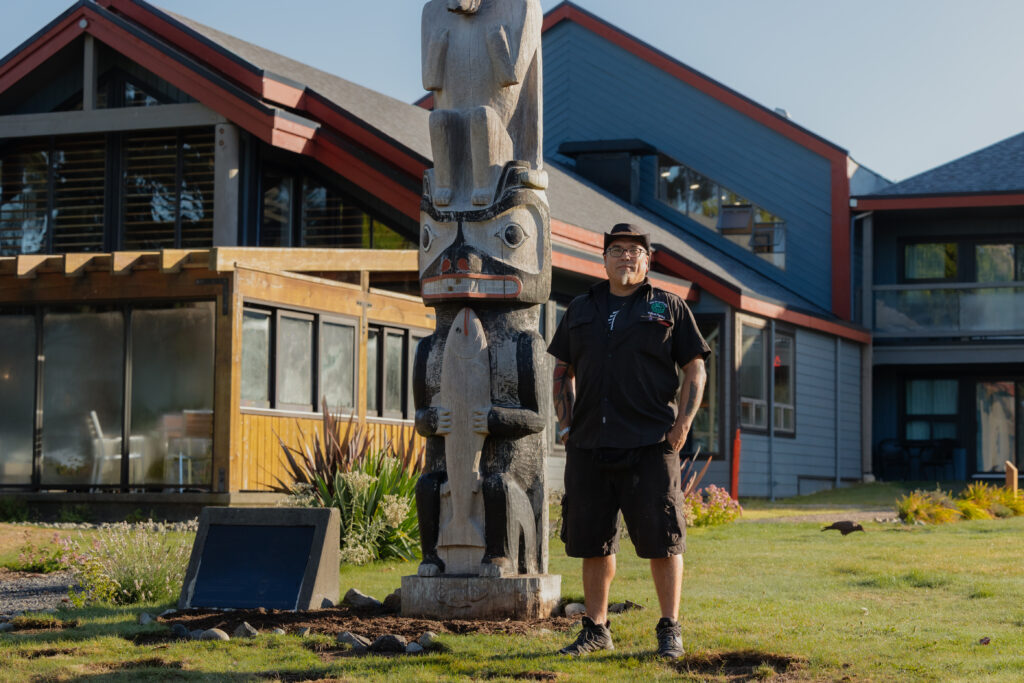
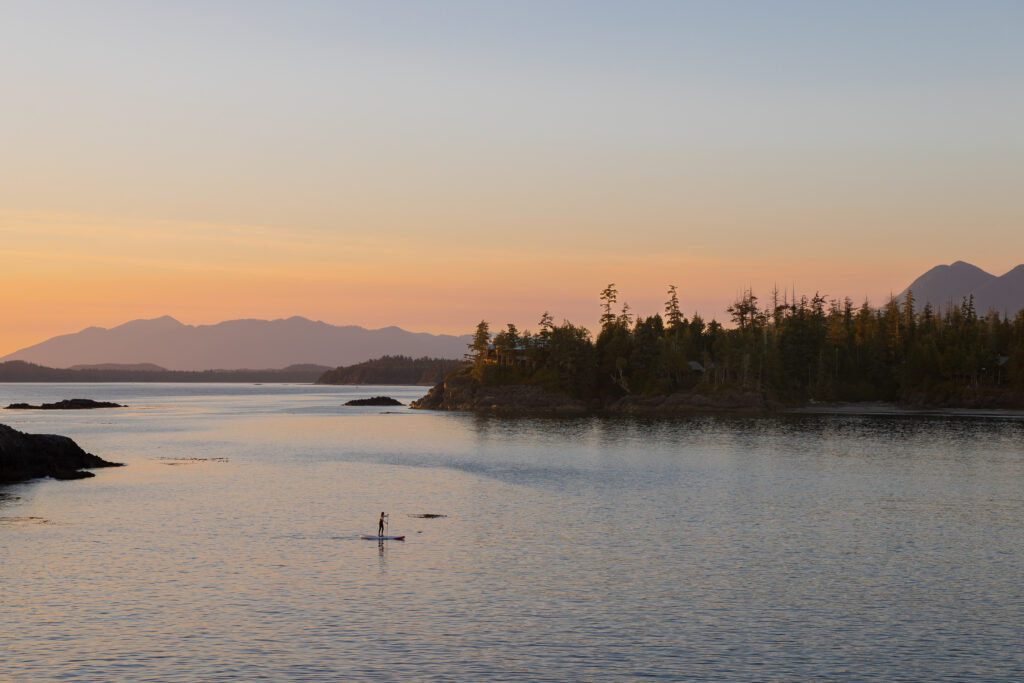
As you stand here on the beach at Tin Wis (aka MacKenzie Beach) mesmerized by that liminal space where shore becomes ocean and ocean becomes sky, we invite you to practice gratitude and respect for this living legacy—the spirit of Tin Wis.
Tin Wis Resort gratefully acknowledges Indigenous Tourism Association of Canada’s Indigenous Tourism Fund Micro and Small Business Stream for supporting travel and participation in the IWI 2024 conference in Roturua, Aotearoa (New Zealand).
To participate in the Province’s public consultation about the establishment of Indigenous-led Clayoquot Sound conservancies concluding April 10, 2024 at 4 p.m. PT, visit: https://engage.gov.bc.ca/govtogetherbc/engagement/clayoquot-sound-conservancies/
Limited tickets are available for naaʔuu, a three-hour interactive cultural event and dining experience running from May 22–June 29, 2024. Buy Tickets Here. To stay at Tin Wis during the festivities, Book Here.
Guests of Tin Wis Resort also enjoy a 10% discount for online bookings at Tofino Paddle Surf onsite year-round. Open daily in April from 10 a.m. to 6 p.m. Let’s see some spring storms and epic beach days! Book Here.
Ask for your discount code when reserving your stay at Tin Wis Resort to receive $20 off your booking with Ahous Adventures online or by calling 250-725-0650. Ahous Adventures is located downtown at 368 Main Street, Unit 313.
To make online reservations for lunch or dinner or order food for pickup at Tofino Browns Socialhouse, visit: https://www.brownssocialhouse.com/tofino & come enjoy their new dog-friendly patio!
Tofino Wine & Dine 2024 Event Information and Tickets Available Here. Reserve your room now from May 31st to June 3rd (2-night minimum). Book Here or by calling the resort. For longer stays, please email: reservations@tinwis.ca
[i] Tla-o-qui-aht First Nation press release, Implementation of tiičmis protected areas in Ḥaaḥuułi of ƛaʔuukʷiʔatḥ Ḥawiiḥ, March 12, 2024.
